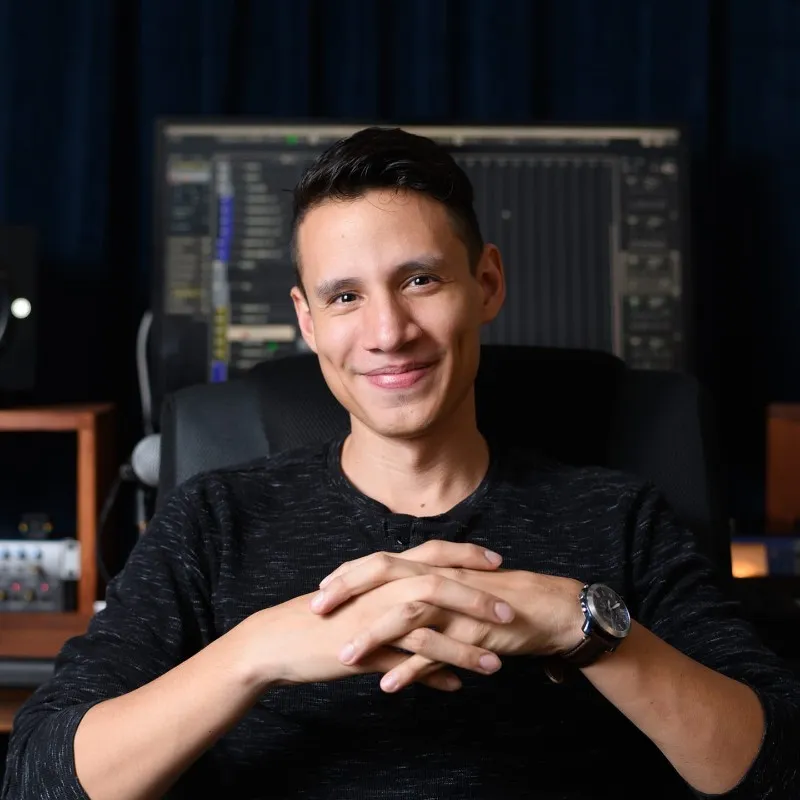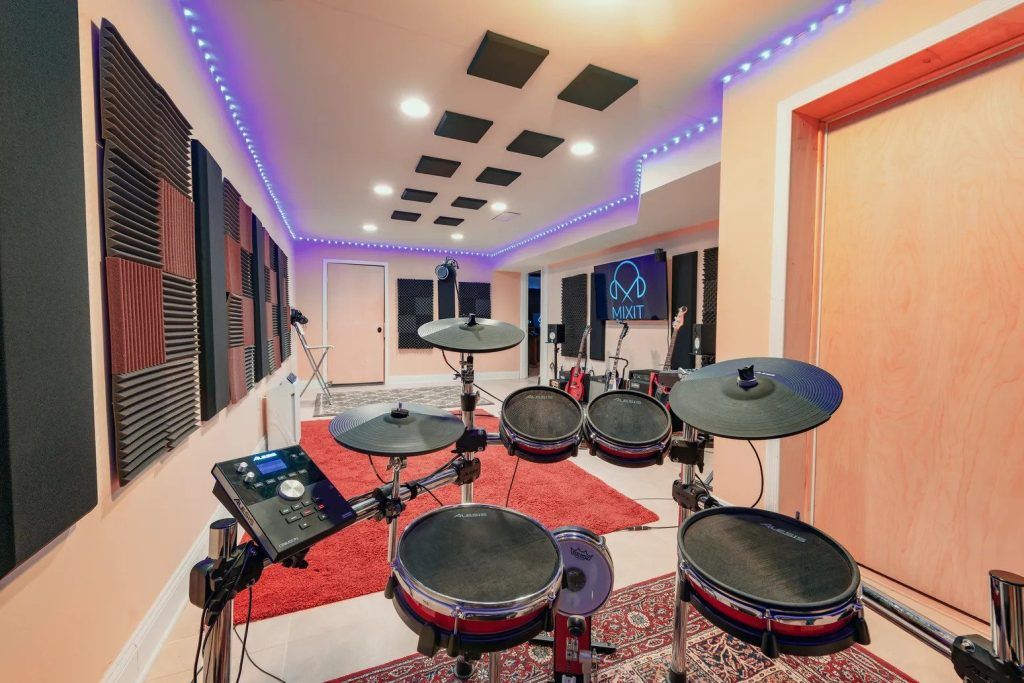
A Talk with Mixit Studios's Ever-Innovative Jhosua Rodriguez
As Alchemical Records celebrates Hispanic Heritage Month, we speak with the visionary face of the DMV-based recording studio.
As Alchemical Records celebrates Hispanic Heritage Month, we speak with the visionary face of the DMV-based recording studio. Headshot of Jhosua Rodriguez in front of his studio computer. Jhosua Rodriguez - photo courtesy of Jhosua Rodriquez Jhosua Rodriguez has seldom had a moment in his life not surrounded by music. He grew up in Cali, Colombia, a city brimming with constant dancing and musical influences from all over the globe. His upbringing was instrumental to what would become his life’s work. “I started writing songs at the age of ten,” he said, “and I’ve been just in love with music. It’s been my essence, ever since I found out that I had some sort of talent for it.”
Though he is now primarily a producer, Rodriguez’s beginnings were rooted in singing and songwriting. Rodriguez’s knack for music was spurred further by winning a local award for “the best rock singer” in Cali. This title brought him some regional fame when he was only a teenager, inspiring him to constantly tour with his band for three years. As he progressed as a musician, he took up more interest in the behind-the-scenes of his songs.
Rodriguez and his bandmates sought out different studios to record their music and further refine their creativity, but found themselves at odds with the big-name producers “that were just there like to collect a paycheck.” After feeling like the touring part of his life was done, Rodriguez chased the pursuit of becoming a full-time independent producer. He was determined to open his own studio and steer clear of the control-seeking, power-hungry temptations of the music industry. Looking back, Rodriguez felt he was a bit overconfident in his youth.
“Oh, you sweet little kid,” he told his younger self, “you didn’t know anything back then. I have always been bold, and I’ve always loved the fact that I go for what I believe in.” Despite his broad ambition, Rodriguez’s determination led him to found Grenade Studios, located in his hometown, the place that nourished his creative spirit.
Grenade was a training ground for bigger things to come for Rodriguez. “I was able to get an idea of what it entailed to first run your own business,” he recounted, “and just do everything and wear all these different hats at different times.” Finding success in his work with artists and commercial entities alike, his career path experimentation led him and his family to pack up their things and head to the States.
Rodriguez knew he wouldn’t be able to immediately transfer his business upon his arrival in America, and took up a variety of different commercial jobs to improve his skill set — as well as fund his work. He had to tackle work outside of music for the very first time, in a brand new country that mainly speaks a tongue he wasn’t fully fluent in. “Whatever I could just get my hands on to get some experience with language,” he explained.
Growing bored of the middle-American humdrum of corporate office life, he and his brother decided to fully chase what they came to the U.S. for — opening their very own recording studio. After years of saving up his income from past positions, Rodriguez funded his mini music center in his suburban Virginia townhouse basement. “‘I don’t think anybody’s gonna come here,'” he recalls thinking, due to the modesty and seemingly sketchy nature of their home studio.
Despite his doubts, Rodriguez did production work around 16 hours a day, seven days a week to lure in skeptical customers and solidify his passion. “I was doing things for three straight months for free,” he lamented, “I was just trying to get my name out there.” After the “brutal” work conditions of his studio-in-the-making, Rodriguez finally started to make money off his work instead of continuing to lose it.
The first American act he produced an album for (completely for free, he added) bought him his first paid contract as a thank-you. The financial security of this contract launched what he called a “snowball effect,” where people from all over the country started to flood his quaint basement. Rodriguez’s abundant talent, and genuine care for the work that he accomplishes, attracted aspiring musicians to his humble abode. “I designed this space with the idea in mind that artists should feel comfortable, like in their home, right?” he used to tell his clients, this is a home studio, but it’s a proper studio.”
The overwhelming support Rodriguez received from local creatives led to the grand opening of a full-size space — cleverly titled Mixit Studios. He wanted his business to stand out among the rest, one that championed artistry over profit. “I would always give my all to every single project that still I do,” he shared, “I give my all to every single project that I put my hands on.”
“I wanted artists to feel supported,” he says about his mission, “that the engineer or the music producer actually cared about their art because I felt that in my early years, nobody did that for me.” This is apparent in the welcoming layout of the studio and its atmospheric recording spaces.
The interior of Mixit Studios featuring an electronic drumse in a brightly lit room with a red carpet.

Besides client comfortabilty and creative support, Rodriguez has always championed innovation in his work at Mixit Studios. The introduction of new technologies to the ever-fluctuating scope of music production has never been something he’s been afraid of. His father was the town’s impassioned repairman, which inspired his son’s penchant for using technological advancement to help others.
Part of Rodriguez’s commitment to innovation involves adapting to rapid change, exemplified by his response to the onslaught of the COVID-19 pandemic. Remote recording was his immediate idea for a solution to the lack of human connection required by mass quarantine. Simply recording vocals and instrumentation over Zoom obviously would not match the audio quality of an in-studio recording, so Rodriguez was forced to experiment.
Fiddling around with different audio technologies he sourced online, Rodriguez found a way to keep his business afloat even when no one could come into the studio. A combination of advanced audio restoration, special equipment, and implementation of high-quality audio streaming courtesy of a third party translated Mixit to a completely remote music hub.
Even in the early days of Mixit, when Rodriguez had minimal financial backing, he had no choice but to learn to use the equipment he could afford to the best of his ability. “Why not just learn how to make this audio sound better, or just work with what we have?,” he decided, “I’m pretty sure that people, if they liked the song, it’s not going to matter if the singer sang on a $8,000 microphone or not.”
Now, Rodriguez is working on a music software app that allows seamless connection between the producer and artist for smooth recording at home. Using the software himself, he’s recorded entire albums without ever having to meet the other musicians face-to-face. “There really is no limit to what you can do if you are open to technology and innovation,” he believes, “it saved my business when a lot of businesses went under.”
Mixit Studios is located in Alexandria, Virginia, and is always eager to welcome new musicians, and promotes flexibilty based on your current living situation and communication preferences. “If you’re not happy, I’m not happy,” he declared, “and that reflects on on our reviews online. If you see we on Google, we only have five star reviews. I’m very proud of that.”
Learn more about Mixit Studios by visiting their website: www.mixitstudios.com.
A conversation with Jhosua Rodriguez, head of Mixit Studios, on the history and impact of his music production space.
